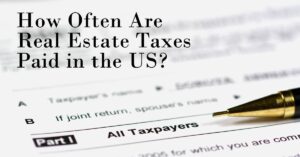If you own a home or a piece of land in the U.S, you are probably familiar with property taxes. Property taxes are levied by local governments on real estate and sometimes on personal property, such as cars or boats. Property taxes are used to fund various public services and projects, such as schools, roads, parks, police, fire, and sanitation.
How Often Are Real Estate Taxes Paid in the United States?
Property Tax Due Dates
Property tax due dates also vary by state and locality. Typically, you pay your property taxes annually, around tax time or the fall. However, some areas allow you to pay your property taxes in installments, such as twice a year or quarterly. It all depends on your local regulations.
Here are some examples of property tax due dates in different states:
- California: Property taxes are due in two installments. The first installment is due on November 1 and covers the period from July 1 to December 31. The second installment is due on February 1 and covers the period from January 1 to June 30.
- Florida: Property taxes are due in one installment on March 31. However, you can get discounts if you pay earlier. For example, you can get a 4% discount if you pay in November, a 3% discount if you pay in December, a 2% discount if you pay in January, or a 1% discount if you pay in February.
- New York: Property taxes are due in one or two installments, depending on your locality. In New York City, for example, property taxes are due in two installments. The first installment is due on July 1 and covers the period from July 1 to December 31. The second installment is due on January 1 and covers the period from January 1 to June 30.
- Texas: Property taxes are due in one installment on January 31. However, you can pay them earlier without penalty. You can also apply for a payment plan or a deferral if you meet certain criteria.
To find out your exact property tax due date and amount, you should contact your local tax collector or assessor office. You should also check if you qualify for any exemptions or reductions that could lower your property tax bill. Some common examples of property tax exemptions are homestead exemption, senior citizen exemption, disability exemption, and veteran exemption.
Property Tax Basics
Property tax is calculated by multiplying the assessed value of your property by the tax rate set by your local jurisdiction. The assessed value is determined by an appraiser or an assessor, who evaluates your property based on its size, location, condition, features, and market value. The tax rate, also known as the millage rate, is expressed as a percentage or a dollar amount per $1,000 of assessed value.
For example, if your home is assessed at $300,000 and your tax rate is 2%, your annual property tax bill would be $6,000 ($300,000 x 0.02). If your tax rate is 15 mills ($15 per $1,000), your annual property tax bill would be $4,500 ($300,000 / 1,000 x 15).
Property tax rates vary widely by state and locality. According to the U.S Census Bureau data, the median annual property tax bill in the U.S was $2,578 in 2020. However, some states have much higher or lower property taxes than others. For instance, New Jersey had the highest median property tax bill of $8,953, while Alabama had the lowest of $618.
Property taxes are an important source of revenue for local governments in the U.S. They help fund various public services and projects that benefit the community. However, property taxes can also be a significant expense for homeowners and landowners. Therefore, it is important to understand how property taxes are calculated and when they are due.
If you have any questions or concerns about your property taxes, you should consult with a professional tax advisor or a local tax authority. They can help you plan ahead and avoid any penalties or interest charges for late or missed payments.

